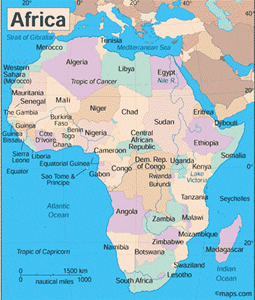
Which African Country Speaks Spanish?
Which African country speaks Spanish? Equatorial Guinea is the only African country that does, with over 68% of the population speaking Spanish. Spanish is a “metropolitan” language and is widely used by international organizations. The country’s people are very proud of their heritage, and they use it proudly, too. Read on to discover more about the country’s Spanish language. Also, learn about its diverse history.
Equatorial Guinea is the only country in Africa that speaks Spanish
If you’ve ever wondered why Spanish is so popular in the Americas, you’ve probably been to Equatorial Guinea, a tiny country in central Africa with a population of around 1.4 million people. The country is known for its oil production, and as a result, has some of the highest per capita incomes in the world. Spanish is the official language of Equatorial Guinea, which is divided into two regions, the mainland and islands. The mainland is the landmass, while the insular region contains many small islands.
It is a “metropolitan” language
If you have ever been to Africa, you have probably heard the term Spanish. Many of us associate Spanish colonialism with South America and the Philippines, but this is not always the case. Equatorial Guinea was the last Spanish colony to declare independence, and its official language is Spanish. Before 1968, it had the highest exports per capita of any country in Africa, and it was also the fifth-largest cocoa producer in the continent.
It is used by many international organizations
The international community is confronted with the challenge of putting Africa on the path of sustainable and balanced development. While no other region in the world needs the services of international organizations more than Africa, its development cannot be achieved without the help of competent institutions. The continent faces several pressing problems, and many international organizations are working to alleviate these problems. Here are some of the ways in which the international community can support African development.
It is spoken by 68% of the population
Located near the Equator and Gulf of Guinea, Equatorial Guinea is the only country in Africa where Spanish is the official language. During the late seventeenth and early eighteenth centuries, the Spanish ruled the area, and now over 68% of the country speaks Spanish. Equatorial Guinea is comprised of two main islands: the mainland and the insular Bioko, which was formerly known as Fernando Po. The capital, Annobon, is a volcanic province.
It is a unitary state
This thesis explores the origins of the unitary state, particularly in the pre-independence era of colonial rule. It focuses on Namibia, Zimbabwe, and Botswana, and tries to distinguish between the two constitutional forms by referring to a range of criteria, including political, administrative, and economic. This thesis also attempts to explain the origins of unitary constitutional forms in the African and European contexts.
It is a one-party state
In many developing countries, the founding leaders have introduced one-party states as a way to prevent divisive tendencies. While some countries experienced brief contested elections at the end of colonialism, most lacked any effective opposition. Because the ruling party had control over the state and expanded its patronage, it sought to maintain its power through suppression of any opposition. It is therefore no surprise that one-party states were characterized by tight control over electoral processes and the occasional plebiscite.
It was a colony of Spain during the Spanish civil war
During the Spanish Civil War, republican authorities created “children’s colonies” to house and educate displaced children from Madrid. This article explores how these “colonies” transformed from simple shelters to communities with different cultural and political identities. The teachers who staffed these colonies shared the republican ideals of active citizenship and sought to create citizens with strong personal convictions. The following are some of the most iconic stories and events of this period.
